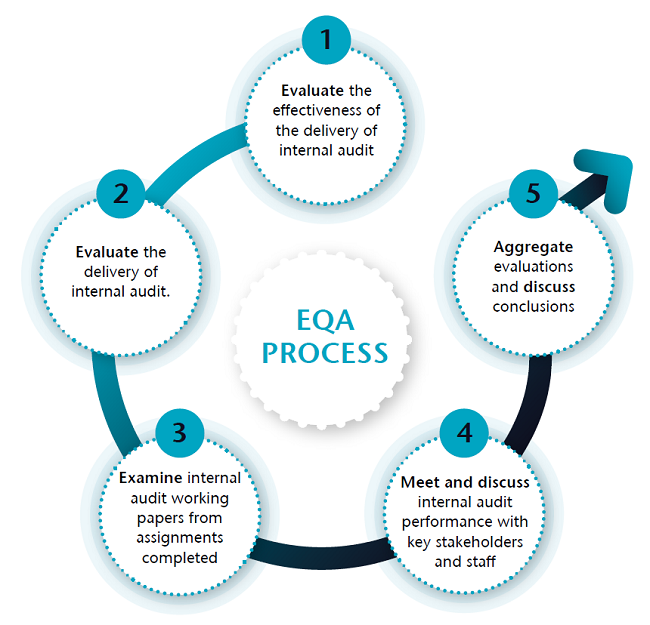External quality assessment
What is an EQA?
An external quality assessment, or EQA, evaluates conformance with the International Professional Practices Framework (IPPF), the Code of Ethics, Public Standards (PSIAS), The Internal Code of Practice (for private and third sectors), and the Internal Audit Financial Services Code of Practice.
The assessment includes an evaluation of whether internal auditors apply the Code of Ethics. The assessment will also include conformance with the financial services code and the public sector standards (PSIAS) if you operate in these sectors.
Why do you need an EQA?
Five reasons why you need an EQA:
- To adhere to standards
- To provide independent assurance
- To raise the profile of internal audit activity within your organisation
- To benchmark your activities against best practice
- To improve the performance of your internal audit function
Why choose us?
Top reasons why you should work with us and what we offer:
- Standard setting: As advocates of the IIA standards, we’re ideally placed to support you in conducting EQA reviews
- Independence: We are independent of any other organisation and because we set the standards, we truly understand them.
- Flexibility: Our highly qualified and experienced reviewers deliver bespoke reviews to match your requirements.
- Objective: We have no vested interest beyond promoting and developing the profession.
- Transparency: We take an open, pragmatic, and collaborative approach to discussing ideas.
Read a summary of EQAs undertaken by us in 2020 – 2021 and discover why internal audit performance matters.
How are EQAs carried out?
Through a five-stage structured approach that assesses the performance of internal audit in line with best practices standards and procedures.
The five-stage process is as follows:
- Evaluate the effectiveness of the delivery of internal audit
- Evaluate the delivery of internal audit
- Examine internal audit working papers from assignments completed
- Meet and discuss internal audit performance with key stakeholders and staff
- Aggregate evaluations and discuss conclusions
Below is a more detailed example example of how the EQA process works (click thumbnail to enlarge image).
Which service is right for you?
Remote readiness assessment
In response to the need for virtual working, CAEs can opt for a remote health check in advance of a full EQA. We use established, secure technology for video conferencing and file sharing. After a high-level assessment, the reviewer provides feedback on the readiness of the function for an EQA and, where appropriate, suggests immediate actions to avoid non-conformance.
On-site readiness assessment
Preparation for a full EQA, with a high-level evaluation of the foundations and attributes of the internal audit activity to highlight potential conformance risks. The reviewer will also offer guidance on how to begin to address any identified issues and improve effectiveness.
Full EQA
Our EQA reviewers will provide a comprehensive assessment that involves surveys and interviews with a range of stakeholders including the CAE, internal audit staff, audit committee chair and members and internal audit customers. This also includes a detailed examination of the internal audit approach and methodology leading to the completion of an independent report which is presented to the audit committee. We adopt a collaborative approach to deliver the best outcome for the organisation, the internal audit activity and the profession.
Validated self-assessment
Evaluation of a self-assessment carried out by the CAE. We will review evidence and conduct interviews with senior management and the chair of the audit committee. A free self-assessment checklist is available to members.
Follow up review
We will assess your implementation of the EQA action plan and document the progress you have made since the review.
Book an EQA or find out more
Drop our Professional Services Manager, Kevin Grimwood, an email with any questions you have or to request a quote. His email address is Kevin.grimwood@iia.org.uk.
Further reading
Here are some useful benchmarking documents and materials:
- Definition of internal auditing – the fundamentals
- Mission statement
- Core principles
- Code of ethics – behaviour
- International Standards – principles and basic requirements of the professional practice of internal auditing
- Quality and the International Standards – conformance
- Quality assurance and improvement programmes – useful approaches
- Implementation guidance – methods and approaches for applying the IPPF
- Supplemental guidance – tools, techniques and step-by-step approaches
- Why your EQA is a priority right now - could an EQA be just what your organisation needs during COVID-19?
- Top reasons to press ahead with EQAs - and why we're well placed to support this.










